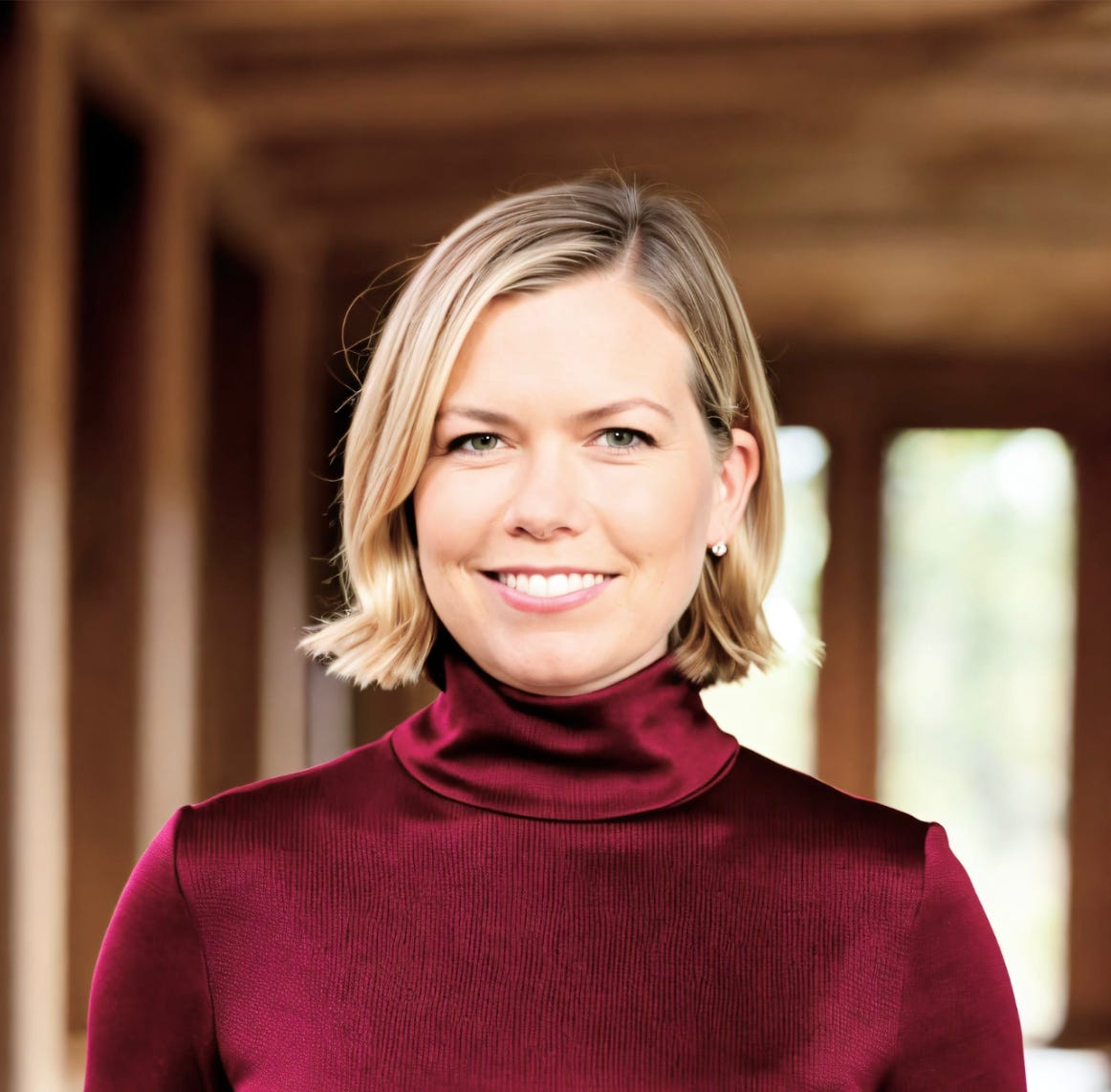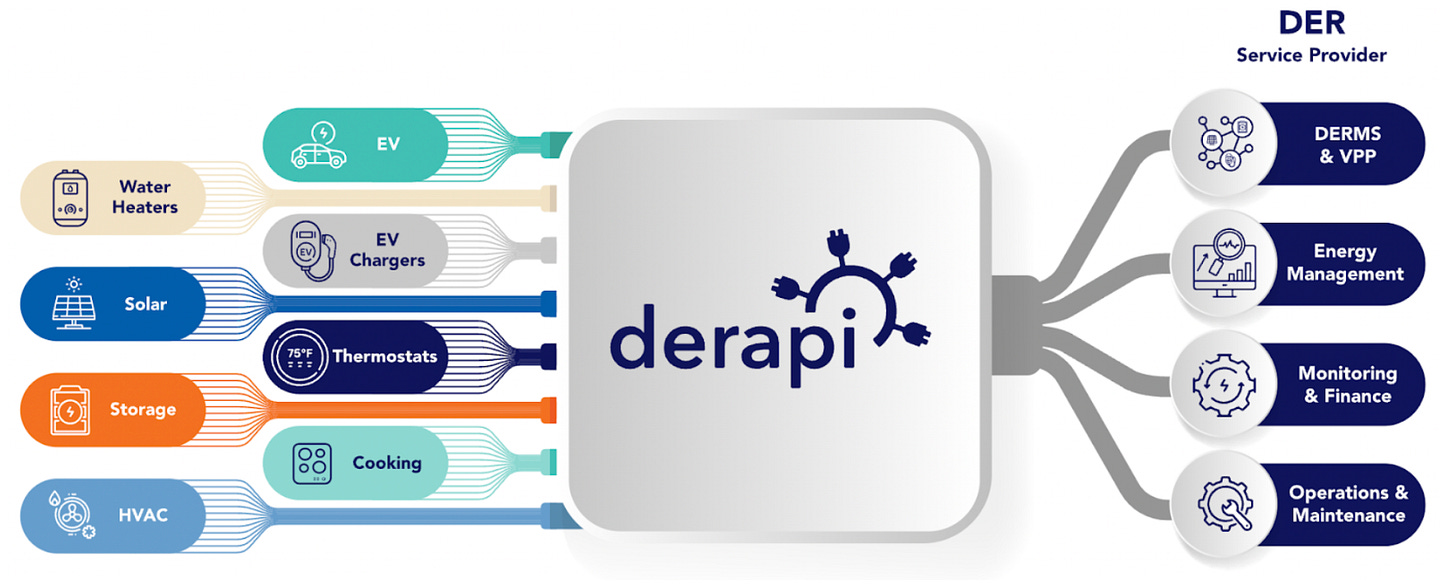Ubiquity Founder: Stina Brock of Derapi (connecting energy assets)
Learn how Derapi pairs CEO Stina Brock's background with the rapid growth of energy assets like solar and batteries to unlock a bright and connected future.
Today we spotlight a founder who leverages software beyond the screen to transform an industry. As always, each Ubiquity founder has their own nerdy background (we define nerdiness as having a deep obsession) that led to founding their startup.
Meet Stina Brock, CEO of Derapi, a cloud API platform for connecting distributed energy resource (DER) devices like solar panels, batteries, thermostats, and more. Ubiquity Ventures invested in Derapi’s late 2022 pre-seed round.
Can you sum up what Derapi does in one sentence?
Derapi is the smart way to connect to distributed energy resources (DERs) for data and control.
Tell us more about Derapi’s product.
Our product is a universal cloud API that makes it easy to connect to and control DERs - like solar and batteries - via a single integration to Derapi. We help energy service companies, solar installers, O&M providers, financial institutions, and ESG-focused entities get access to DER data like solar PV production. We help DERMS platforms, VPP providers, and energy management companies control and dispatch DERs like batteries. With our API, our customers can bring their products to market more quickly, focus their engineering resources on higher-value software development, and make their code simpler and more secure.
What convinced you to join Derapi as CEO?
Having worked in energy for decades, I have personally struggled with the problem that we're trying to solve, and I see how limiting it is for the energy industry. If we can make it faster and easier to connect to DERs, we will unlock grid flexibility that we desperately need to manage a sustainable grid for our future. Harnessing flexibility from DERs will save consumers billions of dollars per year in grid costs.
The timing is perfect to tackle this. Peak demand and load are growing more than they have in decades, driven by consumer electrification trends, AI data center growth, and crypto mining. In parallel, consumers have been electrifying all the devices that they have, like electric vehicles, electric appliances, and electric heating and cooling, meaning that there are more distributed energy resources available than ever before.
What we need to do is to find a way to connect and integrate these devices so that we can build a resilient and sustainable electric grid for all. The value of connecting to and integrating these DERs to provide grid flexibility is likely greater than it ever has been before. Doing it successfully will have a bigger impact than it ever could have in the past because we didn’t previously have this confluence of need and availability of devices, and this was really intriguing to me.
Since I've joined, we've had more customer interest than I ever could have anticipated. This just shows that there is a need for what we're trying to do here; customers are asking for what we have. In my experience, that is somewhat unique from a startup perspective, so it feels good.
How did you notice the need for a cloud-based data infrastructure platform for DER connectivity?
Our entire executive team has worked in this energy space for years, and we've all personally experienced the challenge of trying to connect to and integrate to DERs firsthand. We've worked at a lot of the customers that we as a company are wanting to work with now.
Ideally, these companies would work with as many different types of distributed energy resources as possible, such as PV, batteries, electric vehicles, and electric appliances. Everyone who's trying to do something with DERs would like to work with all of these different types of devices and do smart things with them to benefit the grid, but it's difficult to integrate to these devices and it takes a really long time. If you're spending months integrating to a new EV, then your software engineers are taken away from building the intelligence that you want your product focused on in the first place. If we can make it easier to do that integration piece, we can free up our customers' resources to do these other smart things.
What we want to do is remove that big upfront work to integrate and connect to these devices so that our customers can spend their time on more of the high-value development that will benefit all of us in this energy space. Our team has seen this firsthand, which I think has helped us design a product that we know will work for our customers. Our experiences have influenced our whole philosophy around how we've designed our integrations - we’re designing them as we would have wanted them to be designed when we were at our customers’ companies ourselves.
What failed attempts did your team try before getting to the current solution?
From founding, there was a view that our customer would be the software engineer at our customer entity, and that they would want to work with our API because it would be easier and better for them. But one thing we're seeing is that our customer is actually more on the product or business side of these companies, because they see the value that connecting to more and different types of DERs will bring to what they're trying to offer on their end. Our user is still the software engineer, but our customer is broader. I think that's a little bit of a recent shift that will help us from a marketing perspective and is going to help us from a commercial standpoint as we're going out and trying to talk to people about what we're offering.
The other thing we're realizing is that we have a very specific product. We want customers to use our APIs so that they can be successful doing what they're doing, but we're also starting to realize that customers might need some extra things beyond our API. We’re looking at how we might create some additional software services that can bridge the gap that customers are trying to fill here.
We think of nerds as people who are obsessed with something. What are you nerdy about or obsessed with?
Inside of work, I am obsessed with energy. My whole career has been in the energy space; of my friends, I think I am one of the few that has been so singularly focused and in the same space throughout my career. The reason I'm in this space is because I care about the climate and preventing climate catastrophe, and my way to help is to work to get the energy space to decarbonize.
When I’m not working, I really enjoy being outside, and I'm lucky to live in a place in Wyoming where it's really easy to get outdoors. We do a ton of outdoor activities all year round, like hiking, biking, and skiing. I care about the environment, and I'm interested in making sure that not only our energy is sustainable, but that we have a sustainable food and water supply going forward, as well.
What would you tell your past self if you could give them advice?
The important thing is to just keep taking shots on goal - just keep trying, and keep putting yourself out there. The energy industry changes very slowly, which is frustrating. I've been a part of many startups in the energy space over the years. When I look back, even though it feels like we've barely made progress, I do see that each company that I've been at has moved the ball forward in some way for the next one.
What’s your advice to budding technical founders who haven’t yet taken the leap to launch their new company?
The energy space has certain characteristics that are perhaps different from broader tech. For technical founders who are looking to do startups in the energy space, I think it's really important to develop relationships and to learn. Especially in the US, the energy industry is very relationship-driven.
I think our space is surprisingly small. Everyone seems to know each other, and we're all trying to help one another because the reason we're all doing this is to try to have a positive impact on the world going forward. My advice would be to try to get involved in as many groups as possible where there are people working on climate tech or energy startups and to be open to learning. It is a tricky space to be successful in, so the more help you can get along the way, the better.
Ubiquity Ventures — led by Sunil Nagaraj — is a seed-stage venture capital firm focused on startups solving real-world physical problems with "software beyond the screen", often using smart hardware or machine learning.
If your startup fits this description, fill out the 60-second Ubiquity pitch form and you’ll hear back shortly.





